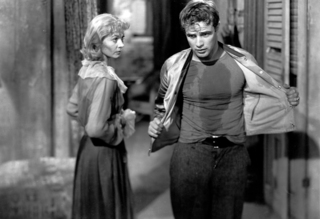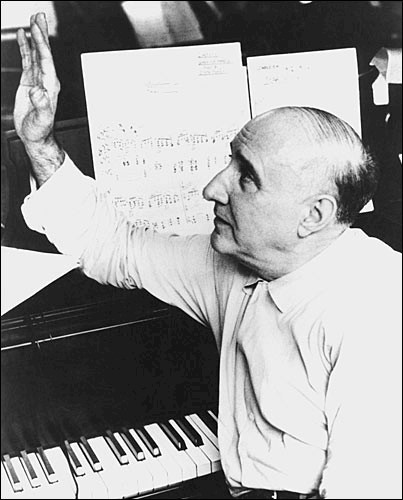
Plot
Under mysterious circumstances, Blanche DuBois, an aging high school teacher, leaves her home in Auriol, Mississippi to travel to New Orleans to live with her sister, Stella Kowalski. She arrives on the train and boards a streetcar named "Desire" and reaches her sister's home in the French Quarter where she discovers that her sister and brother-in-law, Stanley Kowalski, live in a cramped and dilapidated two-room apartment in an old New Orleans tenement.Stella are all that remain of an old aristocratic family. Blanche discloses that the family estate, Belle Reve, has been lost to creditors, and that she wants to stay with Stella and Stanley for a while. Blanche seems lost and broke, with nowhere to go. Stella welcomes her with an open heart.
From the start, Blanche and Stanley are wary of each other. Blanche has a soft-spoken manner; Stanley is rough and loud. His mere presence seems to threaten her, while her behavior and manner arouse suspicion in him. She is especially adroit at patronizing and criticizing Stella from the start. When interrogated about her past, struggling to be polite, Blanche says that she was married and widowed at a young age. She says that she has taken a leave of absence from her job due to her nerves. To satisfy Stanley's skepticism about the loss of the estate, Blanche hands over her papers pertaining to Belle Reve. But Stanley grabs at some of her private papers that she is holding back, and they cascade to the floor. Weeping, she gathers them all back, saying that they are poems from her dead husband. He defends himself by saying that he was just looking out for his family, and then announces that Stella is going to have a baby.
Soon after her arrival, Stanley has a poker night with his friends where Blanche meets Mitch. His courteous manner sets him apart from Stanley's other friends. They like each other right away. This is the start of their romance. Stanley explodes in a drunken rage, striking Stella, and sending his friends running, while Blanche and Stella flee to the upstairs neighbor, Eunice. When his anger subsides, Stanley cries out remorsefully for Stella to come back. "Stella, Stella, hey Stella," he bellows, until she comes down, and Stanley carries her off to bed. In the morning, Blanche tells Stella that she is married to a subhuman animal. In an emotional monologue, she urges her sister to leave Stanley. Stella disagrees with her sister's bluntness and assures Blanche that all is well, and that she does not want to leave.
As the weeks pass into months, the tension rises between Blanche and Stanley. But Blanche has hope in Mitch, telling Stella that she wants to go away with him and not be anyone's problem. She is on the verge of mental collapse, anticipating a marriage proposal from Mitch. Finally, he tells her that they need each other and should be together. But Stanley, still skeptical, begins to research her past and discovers a closet full of skeletons. He tells Stella what Blanche has been concealing from them, that she has a reputation for mental instability and that she was fired from her teaching job in Auriol for having sexual relations with a minor and practically run out of town. He then says that Mitch will not be coming around anymore. Stanley has informed Mitch about Blanche's past, and the news of her promiscuity has turned Mitch off from her. Stella erupts in anger that Stanley has ruined Blanche's chances with Mitch. But the fight is cut short, as she tells Stanley to take her to the hospital; the baby is coming.
As Blanche waits at home for news of the baby, Mitch arrives and confronts her with the stories that Stanley has told him. At first, she denies everything. Then, she breaks down in confession, describing, in a lengthy monologue, her troubled past. As she speaks to Mitch, she gives up the Southern belle façade; her voice grows weary and deep; her face becomes drawn and old; she pleads for his forgiveness, but Mitch is hurt and humiliated and rejects her. Blanche starts screaming, and Mitch runs away. Later that night, while Stella's labor continues, Stanley returns from the hospital to get some sleep, only to find Blanche dressed up in a tattered old gown pretending to be departing on a trip with an old admirer. She disdainfully antagonizes him, asserting her sense of superiority over him, spinning tale after tale about her plans for the future. He sees that she is delusional, but he feels no pity for her. Instead, he seeks to destroy her illusions. They become engaged in a struggle and the fact that Blanche is shown as having regressed into a psychotic state gives the impression that Stanley has raped her.
Weeks later, at another poker game at the Kowalski apartment, Stella and her neighbor, Eunice, are packing Blanche's belongings. Stella and Eunice have told Blanche that she is going on a vacation, but, in truth, Blanche is being committed to a mental hospital. She has suffered a complete mental breakdown. She has told Stella what happened, but Stella cannot believe Blanche's story. Stella, under obvious stress, does not know what to do. An older gentleman and lady come to the door; it is the doctor and nurse come to take Blanche away. Blanche does not recognize them and resists going; she collapses on the floor seized with total confusion. Mitch, present at the poker game, breaks down in tears. The doctor approaches and helps Blanche up. He offers his arm gently to her, and she goes willingly with him, saying, "Whoever you are, I have always depended upon the kindness of strangers." As the car drives away with Blanche, Stella takes the baby upstairs to Eunice's, and says she is never coming back to Stanley again.
Cast
Vivien Leigh as Blanche DuBois ヴィヴィアン・リー
Marlon Brando as Stanley Kowalski マーロン・ブランド
Kim Hunter as Stella Kowalski キム・ハンター
Karl Malden as Harold "Mitch" Mitchell カール・マルデン
Academy Awards
Won
Best Actress (Vivien Leigh)
Best Supporting Actress (Kim Hunter)
Best Supporting Actor (Karl Malden)
Best Art Direction, Black and White
Nominated
Best Picture
Best Director (Elia Kazan)
Best Actor (Marlon Brando)
Best Adapted Screenplay
Best Cinematography, Black and White
Best Costume Design, Black and White
Best Score, Dramatic or Comedy Picture
Best Sound Recording
1951年公開の「欲望という名の電車」という映画についてです。
この映画はピュリッツァー賞受賞のテネシー・ウィリアムズによる同名の戯曲を元にしています。ウィリアムズ自身による脚色です。
この映画の内容は結構難しく、初めて見ただけでは何が起こってるのかわかりづらいところもあります。わからないと映画に見入ることができないかもしれないです。簡単に言えばニューオーリンズを舞台に、落ちぶれた名家出身の女性が、妹とその夫が住む家に居候し、隠していた過去を暴かれ、破滅するまでを描いている。隠していた過去というのは夫が自殺し、多くの男とかかわり合いを持ち、ついには17歳の少年を誘惑し教師をクビになったということです。もともとの戯曲では夫が同性愛者というところまで書かれていますがヘイズ・コードによりすの部分はカットされています。他にもこのコードによってカットされたシーンがある一方、戯曲にはないシーンもあります。代表的なものとしてはオープニングのシーンが挙げられます。戯曲では欲望行きの電車に乗るというシーンは書かれておらず、言及されるだけです。桟橋のダンスカジノや工場のシーンも戯曲にはありませんでした。
キャストは1947年のブロードウェーで上演した時と同じキャストが出ていますが、ブランチ役のジェシカ・タンディはヴィヴィアン・リーに差し替えられました。
1951年度のアカデミー賞では演技部門4つのうち、3つを受賞しました。これは初めてのことで、後年も「ネットワーク」がこの記録に並んだだけです。マーロン・ブランドだけが主演男優賞を逃しました。この年に主演男優賞を受賞したのはハンフリー・ボガートです。
この映画の感想としては、演技合戦をしている感じでしょうか。戯曲をもとにした真面目な映画なので演技力がないとつまらなくなって見てられません。特にヴィヴィアン・リーの演技はすごいですね。狂っていく女を演じきっています。映画を見ている側をイライラさせるほどです(笑)。リーは生涯に2回しかアカデミー主演女優賞のノミネートを受けていませんが2回とも受賞を果たしています。「風と共に去りぬ」の時とはまた違った姿が見れます。
ストーリーだけを見れば大した話じゃなかもしれませんが、深い映画な気がします。
 | 欲望という名の電車 オリジナル・ディレクターズカット [ マーロン・ブランド ] 価格:1,000円 |
【このカテゴリーの最新記事】
-
no image
-
no image
-
no image
-
no image
-
no image






